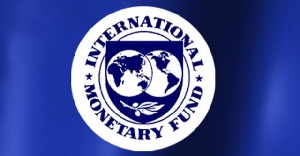The International Monetary Fund (IMF) is coming in for harsh criticism from within the organisation itself for its failure to heed warnings about its “unworkable” neoliberal economic programme that has been detrimental to African countries.
An article in the June edition of the IMF’s in-house magazine, Finance and Development, challenged the international financial institution’s longstanding orthodox macroeconomic policies when the authors argued that some aspects of neoliberalism “have not delivered”.
On Tuesday, the Ghanaian parliament voted massively in favour of ditching an IMF condition that calls on the government to totally forego central bank financing of budget deficit in favour of a $1 billion aid package from the Fund.
Ghanaian MPs, in amending the Bank of Ghana Bill, agreed that the central bank could finance the government’s budget deficit by up to five per cent of the previous year’s total revenue.
The programme that the IMF has had in place in Ghana in the past three years has been criticised for banning public institutions, including universities, from taking on new employees.
It was only last month that the government announced that universities could start recruiting new staff.
In the Finance and Development article, Clara Osei-Boateng of Send Ghana in Accra, a non-governmental organisation promoting good governance, said: “The IMF targets are often inconsistent with expectations of ordinary citizens.
“Currently, government under the IMF programme is looking to tax anything, including pension income.
“There is a freeze on public sector employment as a means to curtail the wage bill.
“Such conditions are inappropriate for a country with high levels of unemployment and underemployment.”
Mozambique, too, is locked in a battle with the IMF, which has set stringent conditions for resuming financial aid to the country, over the issue of loans totalling $1 billion secretly raised by the government.
Prime Minister Carlos Agostinho do Rosario said the loans were used to fund maritime security, which has been a key stumbling block for the country as it tries to exploit its new-found gas reserves.
Indeed, reports indicate that Mozambique is on the verge of signing a huge offshore gas deal with Italy’s Eni, which has the potential of transforming the country into a major global energy player.
“We didn’t report the debt in due time to our people, our parliament, or even the IMF, as we should have done … but the conditions that the country faces are atypical, unique in the world …,” Mr do Rosario explained.
“We have an opposition party that seats at the assembly during the day and lead attacks at night,” he said, referring to clashes between Renamo rebels and governments forces, which have increased since February.
Credit rating agency Moody’s pointed out last month that the IMF conditions for resumption of aid talks with Mozambique were negative for the country’s sovereign debt rating.
Moody’s said the conditions “are negative for the assessment of the risk related to Mozambique’s sovereign debt because their effect is that other international donors in the so-called Group of 14 are waiting for them to be met”.
These disputes with Ghana and Mozambique are coming as a critical report released last month by the IMF’s own watchdog, the Independent Evaluation Office (IEO), took the IFI to task for allowing “political intervention” to cloud its judgement of the eurozone crisis, thus highlighting “issues of accountability and transparency, which helped create the perception that the IMF treated Europe differently”.
Critics pointed out that in supporting the eurozone, the IMF was ignoring its longstanding rule of not bailing out countries unless they immediately restructure their unsustainable public debt piles, and where they have an ability to cushion the adjustment by depreciating their currency.
The IEO, which was established in 2001, criticised the IMF for its “overly optimistic growth projections”, particularly in relation to Greece, and a failure to learn lessons from past mistakes.
“Indeed, the mistakes made in Africa during the so-called lost decade of development in the 1980s, when the IMF held sway over the economic fortunes of the continent, should have focused the minds of its analysts in dealing with current financial and economic crises,” one financial analyst in London told the GNA.
The result of an academic study published in the Washington Post in June found that since 2008 “structural conditions have been a growing component of IMF programmes”.
It concluded that “there is a mismatch between what the IMF says and what the IMF actually does” when it comes to the conditions attached to the Fund’s lending.
It said that these were particularly evident in labour and pensions reforms in countries such as Cote d’Ivoire, Honduras and Moldova, where the IMF required “ceilings on the government wage bill”.
A letter from health experts in the UK and Malawi, published in June in the British medical journal, The Lancet, condemned the IMF’s imposition of a salary cap in Malawi.
They demanded that the IMF “reverse its public sector wage cap edicts” so that the government can “fund salaries for newly trained doctors and other health workers” and meet the “health-related Sustainable Development Goal targets”.
Added to the criticisms of the IMF is the worrying situation facing its Managing Director, Christine Lagarde, who is to face trial for financial negligence in her home country of France when she was finance minister in 2008.
Business News of Tuesday, 9 August 2016
Source: GNA

















